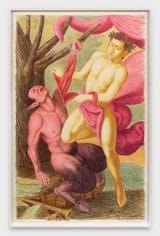Search Results
7/7/2025, 7:29:24 PM
>>24529411
>The oracle, remember, is not revelation; it is the failure of a revelation. But the verification of the oracle can no longer be defined by this fail- ure. Even if it does not correspond to a "complete" revelation, with a reversal of signs, it nonetheless shows that the Oedipal subjectivity, as deeply mythified as it may be, is always oriented towards its own revelation. The mechanism that triggers this revelation is never lacking but the revelation's first stage is embryonic, a purely oracular stage that might define primitive Greek religion.
René Girard – Œdipus Unbound
>reversal (of instruments)
>always oriented towards its own revelation
>casting spells when still in his mother's womb
>primitive to Greek religion
Hear me when I come
https://www.hellenicgods.org/apollogodofimmeasurablelight
Apóllôn is the principal guardian of the Mystiría (Mysteries, Μυστήρια). This can be seen in a mythological interpretation of the Iliás (The Iliad, Ἰλιάς) where Ælǽni (Helen of Troy, Ἑλένη), meaning "basket," is the symbol of the Mysteries, and Apóllôn is defending the Trojans.
Apóllôn is the principal DEITY OF DEIFICATION, AND WHEN APÓLLÔN KILLS, in Iliás and wherever found in the myths, HE DEIFIES: always, as does his father Zefs and all the Olympians.
All the Mysteries come through Zagréus-Diónysos (Zagreus-Dionysus, Ζαγρεύς-Διόνυσος) and Apóllôn is intertwined in his mythology. In the following quotation, Apóllôn is called Dionysodótîs (Διονυσοδότης), “the one who gives Diónysos”:
ὁ γὰρ Διόνυσος, ὅτε τὸ εἴδωλον ἐνέθηκε τῶι ἐσόπτρωι, τούτωι ἐφέσπετο, καὶ οὕτως εἰς τὸ πᾶν ἐμερίσθη. ὁ δε Απόλλων συναγείρει τε αὐτὸν καὶ ἀνάγει καθαρτικός ὢν θεὸς καὶ τοῦ Διονύσου σωτὴρ ὡς ἀληθῶς, καὶ διὰ τοῦτο Διονυσοδότης ἀνυμνεῖται. (σχόλιον Ὀλυμπιοδώρου επὶ Φαίδωνος Πλάτωνος B ρκή p. 111, 14 William Norvin)
“For Diónysos, when he set his image into the mirror, pursued it, and in this way, was scattered everywhere. But Apóllôn (Ἀπόλλων) gathers him together and revives him, for he being a purifying God, and truly the savior of Diónysos, is thus celebrated as ‘he who gives us Diónysos’ (Διονυσοδότης).”
(trans. by the author)
I don't think we should insist on the difference between the satyre and Apollo. This flaying is an act of introspection. This whole myth describes the transition from prince of stories to Prince of Stories.
>It is this myth reduced to "fatality" which anthropologists discover everywhere. The presence, within the myth itself, of the formidable and fertile mechanism that always leads to intersubjective struggle and that can lead to demythification is no doubt peculiar to the Oedipal myth proper and to the Western world. In this privileged myth, the order of the episodes is not indifferent; it is linked to the process of unveiling – that indeed is what defines it as historical
Girard – a few paragraphs further down in When these things begin
>The oracle, remember, is not revelation; it is the failure of a revelation. But the verification of the oracle can no longer be defined by this fail- ure. Even if it does not correspond to a "complete" revelation, with a reversal of signs, it nonetheless shows that the Oedipal subjectivity, as deeply mythified as it may be, is always oriented towards its own revelation. The mechanism that triggers this revelation is never lacking but the revelation's first stage is embryonic, a purely oracular stage that might define primitive Greek religion.
René Girard – Œdipus Unbound
>reversal (of instruments)
>always oriented towards its own revelation
>casting spells when still in his mother's womb
>primitive to Greek religion
Hear me when I come
https://www.hellenicgods.org/apollogodofimmeasurablelight
Apóllôn is the principal guardian of the Mystiría (Mysteries, Μυστήρια). This can be seen in a mythological interpretation of the Iliás (The Iliad, Ἰλιάς) where Ælǽni (Helen of Troy, Ἑλένη), meaning "basket," is the symbol of the Mysteries, and Apóllôn is defending the Trojans.
Apóllôn is the principal DEITY OF DEIFICATION, AND WHEN APÓLLÔN KILLS, in Iliás and wherever found in the myths, HE DEIFIES: always, as does his father Zefs and all the Olympians.
All the Mysteries come through Zagréus-Diónysos (Zagreus-Dionysus, Ζαγρεύς-Διόνυσος) and Apóllôn is intertwined in his mythology. In the following quotation, Apóllôn is called Dionysodótîs (Διονυσοδότης), “the one who gives Diónysos”:
ὁ γὰρ Διόνυσος, ὅτε τὸ εἴδωλον ἐνέθηκε τῶι ἐσόπτρωι, τούτωι ἐφέσπετο, καὶ οὕτως εἰς τὸ πᾶν ἐμερίσθη. ὁ δε Απόλλων συναγείρει τε αὐτὸν καὶ ἀνάγει καθαρτικός ὢν θεὸς καὶ τοῦ Διονύσου σωτὴρ ὡς ἀληθῶς, καὶ διὰ τοῦτο Διονυσοδότης ἀνυμνεῖται. (σχόλιον Ὀλυμπιοδώρου επὶ Φαίδωνος Πλάτωνος B ρκή p. 111, 14 William Norvin)
“For Diónysos, when he set his image into the mirror, pursued it, and in this way, was scattered everywhere. But Apóllôn (Ἀπόλλων) gathers him together and revives him, for he being a purifying God, and truly the savior of Diónysos, is thus celebrated as ‘he who gives us Diónysos’ (Διονυσοδότης).”
(trans. by the author)
I don't think we should insist on the difference between the satyre and Apollo. This flaying is an act of introspection. This whole myth describes the transition from prince of stories to Prince of Stories.
>It is this myth reduced to "fatality" which anthropologists discover everywhere. The presence, within the myth itself, of the formidable and fertile mechanism that always leads to intersubjective struggle and that can lead to demythification is no doubt peculiar to the Oedipal myth proper and to the Western world. In this privileged myth, the order of the episodes is not indifferent; it is linked to the process of unveiling – that indeed is what defines it as historical
Girard – a few paragraphs further down in When these things begin
7/5/2025, 9:01:18 PM
Page 1

